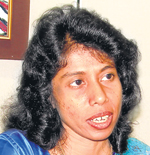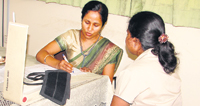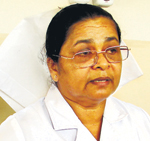|
|
||||||
|
Be screened in time to save your life Rotary’s free cancer detection centre a boon to patients
An average of 12,000 – 13,000 new cases of cancer are diagnosed every year in Sri Lanka. The high mortality of cancer in Sri Lanka is largely due to their late presentation to the health authorities. According to studies, 30% – 40% of cancer related deaths can be prevented with early detection by screening as well as education. Thus, about 5,000 lives could be saved every year, if awareness and the necessary facilities were available. This underlines the vital importance of screening and early detection in the diagnosis of cancer. Campaigns to educate people about the benefits of early screening have been carried out by the National Cancer Control Programme and other organisations. However, the lack of a screening and detection facility has been a great drawback. The Maharagama Cancer Hospital is not conveniently located. It is also overcrowded. Further the priority there is for treatment, rather than screening. Thus there are long delays in carrying out screenings. There is also reluctance on the part of the public to be seen at the Maharagama hospital. A Cancer Screening Centre, to provide free services in diagnosis, counselling and health education has been identified as an urgent need.
It is with this in mind that the Rotary Club of Colombo embarked on a community service project to set up a Cancer Prevention and Early Detection Centre. “We wanted to do something really worthwhile to mark 75 years of Rotary,” said Rotarian Nirmali Samaratunga, Director, Community Service, adding that people don’t appreciate the importance of screening and detection. The objective of this project is to save lives by early detection of cancer, by constructing the National Centre for Cancer Screening (NCCS). The centre, which will be easily accessible to the public would be constructed on land provided by the government. Once built and equipped by the Rotary Club, it will be handed over to the Cancer Control Programme (CCP) of the Cancer Institute, Maharagama. A management committee would be formed with representatives of the CCP and Rotary. Having signed an MOU with the Ministry of Health, the Rotary Club launched the project in 2003, under the leadership of the late Nihal de Silva, who was then President of the club. A small team of members met every Monday to discuss the project and make presentations to potential donors. The initial problem was locating a suitable land, Nirmali said. Finally in 2004, a land belonging to the ministry was identified. The building plans, which were drawn up by Migara Alwis and Design Consortium free of charge, have been approved by the Municipal Council. The estimated cost of the building is Rs. 30 million. The club has raised Rs. 11 million through fund raisers and pledges, which is sufficient to start the construction. They now need to raise the balance funds for the building.
Nirmali explained that Rotary has a scheme called matching grants, by which they would be able to fund the necessary equipment through Rotary Clubs abroad. The equipment is estimated to cost Rs. 40 million. However, she said that this would not be a problem once they were able to raise funds for the construction. So the urgent need at present is to raise the balance funds needed to complete the building. When completed, the centre will provide all screening and investigation facilities under one roof in an environment designed to reduce the stress of the screening process. The facilities will be made freely available especially to people in the low income group. The centre will be equipped with three examination rooms with facilities for risk assessment and clinical examinations, colonoscopy facilities, a medical records and statistical unit, facilities for pap smears and cyto-screening, laboratory investigation facilities and a health education unit for enhancing public awareness and counselling. “As securing the land was taking time, we rented premises as a temporary arrangement, so that we could offer screening facilities to the public without further delay,” Nirmali said. The temporary screening facility, which was opened in April 2004, is the only such facility that serves the public free of charge. Conveniently located at Elvitigala Mawatha, the centre is compact, clean and well maintained. It is open daily for half a day. When the new centre is ready, however, they would be able to recruit special staff and stay open the full day. Sister Sriya Walisundera, from the Maharagama Cancer Control Programme is in charge of the centre, assisted by another nurse from the hospital. Sr. Walisundera has 27 years experience at the Cancer Hospital and six years with the Cancer Control Programme. She said about 10 – 15 patients come for screening per day. “We speak to each patient for about half-an-hour before the investigations, as it is a stressful process. Separate forms are given for male and female patients. We do a general check-up of blood pressure, blood sugar and so on, in addition to screening for cancer. Samples are then sent to Maharagama for testing, but when we have the new building, lab facilities will also be available.” “The centre, though small, has been very effective,” commented Nirmali. “The statistics justify the need.” From May 2004 – March 2006, 1,358 female and 290 male patients had registered for screening. Of these, 40% females and 7% males had been diagnosed with cancer-related detections, and referred for further investigations and treatment. About 80% of the patients are from rural areas. Over 50% are female patients. The highest incidence is breast cancer, followed by cervical cancer. It has been found that early detection could result in complete cure and enhanced quality of life. For example, pap smears detect cancer 4 – 5 years before they become malignant. A breast lump detected early could prevent a mastectomy. Large bowel cancers, if detected early, would prevent the need for a colostomy. All cases diagnosed early could be treated early, resulting in longer life span. Lalani, living in Maharagama, had heard about this centre from a relative. She had come with her husband and adopted son. She is 44 years old, 15 years married and has not had children. “I felt my stomach was a little enlarged and some pain on the left side, so I thought I should get checked,” she said. I came here, because I heard it was good,” she said.
Another male patient was being examined by Dr. Thilini Indiketiya, from the Maharagama Cancer Control Programme. His father had died of leukemia and he also has a brother with a lymphoma. However, he was found to be clear of any malignancies. “Many patients, who have had incidence of cancer in the family, get worried and come for screening,” Dr. Indiketiya said. “About 60% of the cases are tobacco-related and enhanced by alcohol,” said Dr. Yasantha Ariyaratne, Director, National Cancer Control Programme and Cancer Hospital, Maharagama. “So education and creating awareness are very important factors. The project will be completed in three phases, since setting up a screening clinic with all facilities at once would be very costly. A clinic with basic facilities for screening will be set up, as the first stage, with provision for expansion into additional units for lab investigation, endoscopy unit and radiology unit and eventually a molecular biology research and investigation laboratory. “A project of this magnitude cannot be completed without extensive support from the community,” said Nirmali. “We need your help. Please join hands with Rotary and contribute generously to this worthwhile, life-saving project.” |
||||||
Copyright © 2006 Wijeya Newspapers
Ltd. All rights reserved. |


